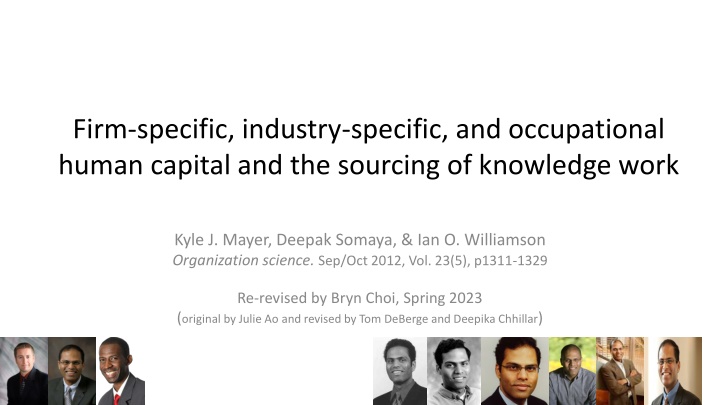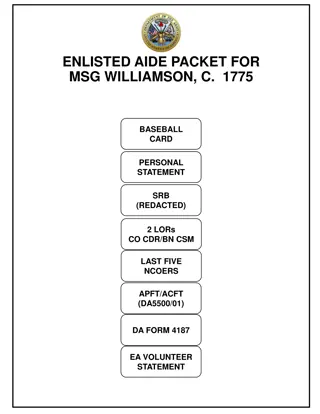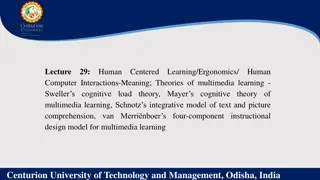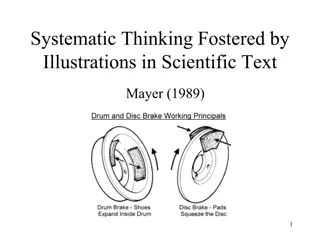
Human Capital in Knowledge Work: Firm, Industry, Occupational Perspectives
Explore the impact of firm-specific, industry-specific, and occupational human capital on knowledge work sourcing decisions. Understand how prior governance choices influence capabilities and outsourcing. Delve into theories linking governance and capabilities development, emphasizing human capital as a vital factor. Learn about different types of human capital - firm-specific, industry-specific, and occupational - and their significance in knowledge work dynamics.
Download Presentation

Please find below an Image/Link to download the presentation.
The content on the website is provided AS IS for your information and personal use only. It may not be sold, licensed, or shared on other websites without obtaining consent from the author. If you encounter any issues during the download, it is possible that the publisher has removed the file from their server.
You are allowed to download the files provided on this website for personal or commercial use, subject to the condition that they are used lawfully. All files are the property of their respective owners.
The content on the website is provided AS IS for your information and personal use only. It may not be sold, licensed, or shared on other websites without obtaining consent from the author.
E N D
Presentation Transcript
Firm-specific, industry-specific, and occupational human capital and the sourcing of knowledge work Kyle J. Mayer, Deepak Somaya, & Ian O. Williamson Organization science. Sep/Oct 2012, Vol. 23(5), p1311-1329 Re-revised by Bryn Choi, Spring 2023 (original by Julie Ao and revised by Tom DeBerge and Deepika Chhillar)
Research Question and Purpose Past Governance Choices Future Governance Choices Internalizing Internalizing Different Firm Capabilities Outsourcing Outsourcing Research Question: What drives heterogeneity in firm capabilities? Purpose: In this paper, we examine how these differential firm capabilities may arise and in turn influence outsourcing decisions, especially in the context of knowledge work (Mayer, Somaya, & Williamson, 2012: 1). Prior make-or- buy (governance) decisions give rise to specific capabilities that then influence future governance decisions. 2
Develops a human capital-centered framework of capability development and sourcing decisions in knowledge work. 1. Focuses on the functional level of human capital [HC], the primary location of firm knowledge and capabilities (Grant 1996; Felin & Hesterly, 2007) 2. Emphasizes two central logics: impact of prior governance choices on HC; impact on governance choices on different incentive structures between firms Contributions 3. Considers contingencies that impact process of HC accumulation 4. Uses project-level patent data 3
Theory/Model Linking TCE (governance) and RBV (capabilities) literature by considering how governance leads to development of capabilities, namely human capital. Managerial Rents Model (Castanias & Helfat 1991, 2001) Knowledge Sourcing Choice Human Capital (Becker 1964) Firm specific Industry specific General Occupational 4
Three Types of Human Capital (Castanias & Helfat, 1991) Firm-Specific Human Capital: Knowledge and skills that are unique to the firm (e.g., knowledge about specific strategies, processes, and technologies of the firm). Industry-Specific Human Capital: Knowledge about the industry setting or domain in which a project is situated and is re-deployable across a set of firms with projects in the same industry. Occupational (General) Human Capital: Knowledge and skills required to perform work within a professional or functional area, often easily transferred across different industries and firm settings. 5
Hypothesis 1 (Firm-Specific) H1: Firms are less likely to outsource knowledge projects the greater their relevant firm- specific human capital developed by performing prior related projects internally. External suppliers disadvantages (Grant 1996; Kogut & Zander 1992, 1996) Time compression diseconomies (Dierickx & Cool 1989, Knott et al. 2003) Governance inseparabilities (Argyres & Liebeskind 1999) Inter-Organizational Learning [relatedly, but not explicitly, Transactional Value (Zajac and Olsen, 1993)] (Mayer & Argyres, 2004) 6
Hypothesis 2 (Industry-specific) H2: Firms are less likely to outsource knowledge projects the greater the relevant industry- specific human capital developed by previously internalizing knowledge projects in the same domain. Suppliers withhold knowledge from client Difficult to learn industry-specific human capital (Darr et al. 1995, Argote & Ingram 2000) Learning by doing (i.e., through internalization) (Hatch & Dyer 2004) 7
Hypothesis 3 (Firm/Industry interaction) H3: The marginal impact of higher firm-specific or industry-specific human capital on the tendency of firms to internalize knowledge work is highest when the other type of human capital (firm-specific or industry-specific) is low. Relevance of both types of HC for an activity One is high, another is low: Increased capability to the knowledge work Coordination benefits of using internal HC Marginal benefits when firm- or industry- HC is high and the other increases 8
Hypothesis 4 (Occupational) H4: Firms are more likely to outsource knowledge projects situated in areas that are highly contested (and thus rely heavily on occupational human capital) Firm cannot replicate specialized suppliers incentives and, therefore, capability development Competition creates incentives to use external occupational HC Negative consequences of potential errors are large Perceived gains from using expert occupational HC are large 9
Hypothesis 5 (Contingency) H5: The larger the firm s internal staff (in the focal occupational area), the weaker the (positive) effect of a project being in a highly contested area on the probability of outsourcing (i.e., the size of the firm s internal staff negatively moderates the effect of being in a highly contested area on outsourcing). Larger internal staff lower outsourcing Organize more efficiently as a hierarchy better incentive structure (Garicano 2000, Garicano & Rossi-Hansberg 2006) Occupational HC within the firm increases the absorptive capacity for knowledge (Cohen & Levinthal 1990) 10
129 public U.S. firms in the 1989 Fortune 500 survey in technology-based industries Industry includes, chemicals; computer manufacturing; electronics; pharmaceuticals; scientific and photographic equipment Data Sample Patents that were filed and obtained (patent prosecution) during 1990-1995 Core sample of 80,129 patents 11
H1 and H2 corroborated H3 corroborated H4 corroborated H5 corroborated 12
Findings suggest the organizations should carefully consider the long-term effects of their outsourcing decisions. A firm s governance choices are not only based on minimizing transaction costs, but also building block for the firm s stock of human capital. Summary of Contributions: i. Extends Castanias and Helfat s (1991, 2001) framework of firm-specific, industry-specific, and general HC by focusing on occupational HC as a subset of general HC ii. Demonstrates how governance choices impact HC- based capability development, which influences knowledge sourcing decisions iii. Integrates TCE (governance) and RBV (capabilities) iv. Employs detailed project-level data from patent prosecution work Conclusion 13
Discussion Chicken or Egg: Do governance choices come first or do capabilities? (In other words, the process is still not well understood, and this paper considers a relatively short time span. When do the paths begin to diverge and why?). What are some of the limitations of using internalized patent prosecution (that is, the work of drafting, filing, and obtaining patents) to measure human capital? 14






















